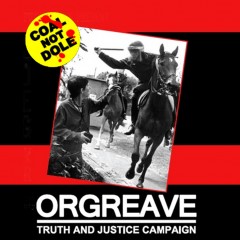 It is bizarre that the so-called Independent Police Complaints Commission (IPCC) has now spent 18 months dancing round the maypole trying to decide whether to launch a full inquiry into police corruption surrounding Orgreave in June 1984. With a typical establishment euphemism they are engaged in a ‘scoping inquiry’ (for which read: time-wasting) as to whether police officers fabricated statements – it is clear beyond any doubt that the police did collude in preparing testimony for the court.
It is bizarre that the so-called Independent Police Complaints Commission (IPCC) has now spent 18 months dancing round the maypole trying to decide whether to launch a full inquiry into police corruption surrounding Orgreave in June 1984. With a typical establishment euphemism they are engaged in a ‘scoping inquiry’ (for which read: time-wasting) as to whether police officers fabricated statements – it is clear beyond any doubt that the police did collude in preparing testimony for the court.
After 18 months they have still not even interviewed key witnesses to the alleged corruption. The IPCC has either grievously failed in its duty to take the issue seriously or has been leaned on to spin out its deliberations an absurdly long time in order to frustrate a full public inquiry into police corruption since it has been ruled that this is shelved pending the IPCC conclusions.
The evidence of corruption is blatant. A BBC Yorkshire ‘Inside Out’ documentary discovered identical wording in 34 separate statements by police. Police officers at Orgreave were asked by South Yorkshire police detectives to describe in their statements scenes they’d simply never seen, with some Liverpool officers claiming they’d witnessed a riot at Orgreave, but they had never left Merseyside. The evidence has indeed already been admitted in court, with a number of lawyers and defendants able to testify to this effect, as well as 12 jurors. So what is the IPCC waiting for?
But it’s not just collusion in the preparation of statements that the police need to be called to account for. The far more serious charges are that the police acted – with the connivance, indeed urgent prompting, of Thatcher, Ridley and Walker – in a manner far beyond the constitutional limits granted to them. Their proper function of keeping the peace was subordinated to the paramilitary role of forcing a way through picket lines for those breaking the strike.
The police were also organised into ‘large mobile squads’ (in the language of Ridley’s strike-breaking plan) in huge numbers not only at pitheads and other picketing targets, but also across the country in halting pickets seeking to prevent the movement of coal and working miners. At Orgreave itself the violence of the police operations, with 5,000 police officers using horseback baton charges and snatch squads, could not conceivably be justified as preserving law and order: it was a carefully planned aggressive military-style drive to break the spirit of the miners and to crush the strike.
The whole issue should now immediately be taken out of the hands of the time-wasting IPCC and a full and proper public inquiry be set up promptly to identify and hold to account all those responsible for this unlawful descent into police para-militarism.
For more information or to become involved, visit the Orgreave Truth and Justice Campaign